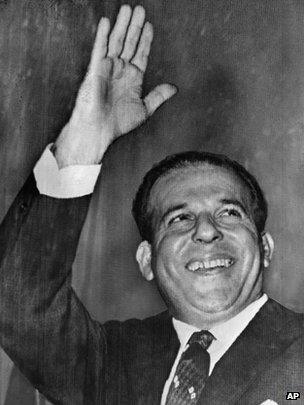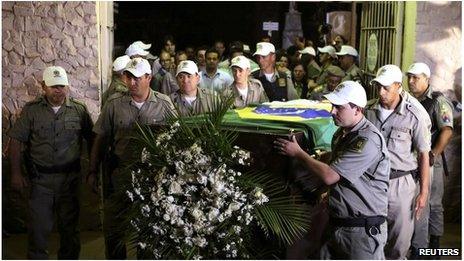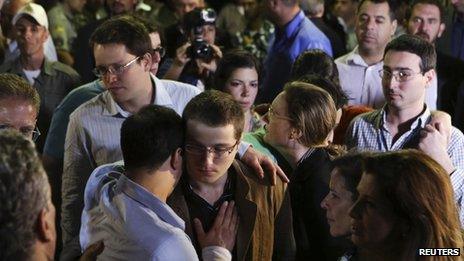Brazilian ex-President Joao Goulart's remains exhumed
- Published

Joao Goulart, nicknamed Jango, was deposed in a bloodless coup in 1964
The exhumed remains of former Brazilian President Joao Goulart will be taken to Brasilia on Thursday to establish whether he may have been poisoned.
Mr Goulart, widely known as Jango, died in 1976 in exile in Argentina. His cause of death was deemed to have been a heart attack.
But a former Uruguayan intelligence officer has said Mr Goulart was poisoned by agents working for the region's military governments.
Mr Goulart governed from 1961 to 1964.
Forensic scientists exhumed the remains on Wednesday from the family pantheon in Sao Borja, a small Brazilian town near the Argentine border.
The remains were taken by car to the nearby town of Santa Maria from where they will be flown to Brasilia on Thursday.
There, they will be received with full state honours at a ceremony expected to be attended by President Dilma Rousseff.
Mr Goulart was the only Brazilian president to be buried without the honours usually given to a former head of state.
Toxicology tests will be carried out on the remains and samples sent abroad to be analysed, local reports say.
Death doubts
A progressive leader with left-wing sympathies during the height of the Cold War, Mr Goulart was deposed in the 1964 military coup.

The remains will be flown to Brasilia for an official ceremony
He fled first to Uruguay, where he settled as a farmer, and in 1973 to Argentina on the invitation of its president, Juan Peron.
Mr Goulart was found dead on 6 December 1976 in the Argentine city of Mercedes, nine months after a military junta had overthrown the government of Juan Peron's widow, Isabel Peron.
Officials at the time said he had died of a heart attack, but no post mortem examination was carried out by the authorities in either Argentina or Brazil, where he was taken for burial.
Doubts about his death resurfaced five years ago when a former Uruguayan intelligence officer serving a sentence for drug smuggling in Brazil alleged Mr Goulart was poisoned by Uruguayan agents at the request of Brazilian military rulers.
'New chapter'
The intelligence officer, Mario Neira, said the alleged murder was part of Operation Condor, a plan under which the military governments of Argentina, Bolivia, Brazil, Chile, Paraguay and Uruguay collaborated to eliminate their political opponents in the 1970s and 80s.
Neira alleges that Mr Goulart died after his heart medication was swapped with one altered to cause a cardiac attack, by agents working on behalf of the Brazilian military.
Brazil's National Truth Commission, which started work last year, agreed to investigate the claims with the help of the presidency's human rights commission.
"Today we will open a new chapter in the tale of mystery which has surround the death 37 years ago of the former president," the human rights commission said in a statement.
"The exhumation will put an end to the anguish of his family and thousands of Brazilians who have sufficient reason to believe that his death did not occur spontaneously, as stated in the death certificate - which was issued without a prior post mortem examination," they added.

Relatives of Mr Goulart gathered at the cemetery in Sao Borja
The former president's grandson, Joao Marcelo Goulart, said it was "a historic moment not just for the family but also for the country and all the relatives of those killed, disappeared, tortured and exiled by the military dictatorship".
Up to 500 people were killed or disappeared under Brazil's military rule - a far lower number than in shorter periods of military rule in neighbouring Argentina and Chile.
But thousands of Brazilians were tortured, exiled or deprived of their political rights.
- Published2 April 2013
- Published14 March 2012
- Published18 November 2011